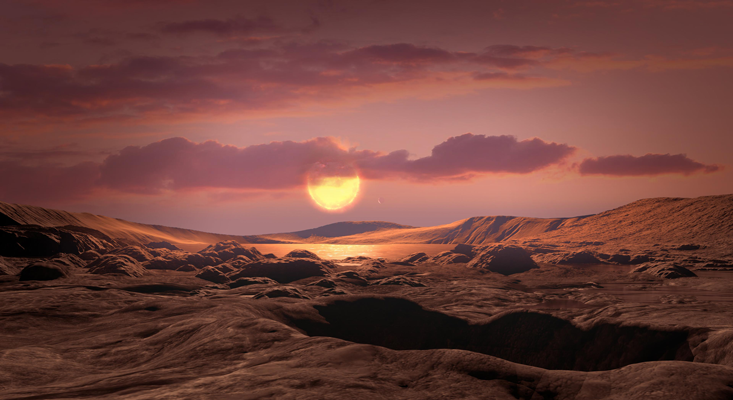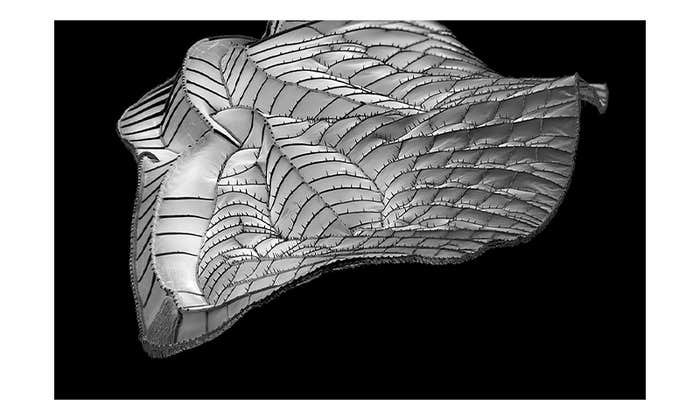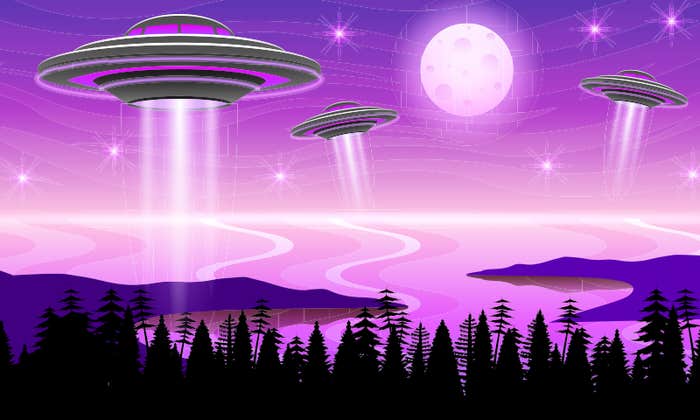Let me tell you what it’s like to be an astrobiologist.
I painted a white picket fence this summer. No one asked me to. It was a task I’d set myself without realizing what a long-winded and frustrating process it would be. But eventually that endless scraping, priming, painting, and maneuvering settled into something therapeutic, even meditative.
I’d paint the apex—dab, dab—run down the narrow sides, coat the smooth front, shuffle along, repeat. All the while acutely aware of being surrounded by the churn of summer in the northern hemisphere of a living planet. Long-legged harvestmen arachnids staking their turf from fence post to fence post. Hummingbirds squabbling noisily from within their strange half-bird, half-insect dimension. Plant life bursting from every seam of soil; from the dusty grains between paving slabs to the mulchy damp beneath maple trees, green shoots fighting a slow-motion war for atoms and photons. The kind of war that likely plays out across the observable universe in any place where matter has become structured into the self-propagating, energy-hungry stuff we call life.

It also dawned on me that my immersion in this glorious scene felt invasive and disjointed. The fence I was painting served no clear Darwinian purpose (other than as a temporary set of crevice-habitats for some insects). The paints I was dousing these pieces of dead tree in were the result of a massive industrial-chemical infrastructure. An infrastructure rearranging compounds and creating new ones in a tsunami of reactive matter perhaps unseen on the Earth during the previous 4 billion years.
Even the dreamlike haze that would periodically obscure the beating sun was smoke from wildfires thousands of miles away, attributable to a variety of human-induced changes in the fundamental workings of the planet. Changes that are conceivably signaling our technological presence to any other distant species pursuing its own curiosities or impulses about life in the cosmos. Species with their own kinds of astrobiologists.
To be an astrobiologist means becoming acutely aware of the living world and our place within its multiplicity of layers and branches. A part of the extraordinary promise of this awareness is that while something like the evolutionary role and significance of my painted picket fence is not obvious—good, bad, or otherwise—it is surely explicable, if we can only expand our minds enough.
For a thinking species to have no good answer to the nature of life is slightly embarrassing.
A couple of hundred years ago the increasing specialization of natural philosophers in our industrialized empires prompted the formal birth of “scientists” with labels like physicist, chemist, and biologist. This probably made sense at the time, but it not only pushed science further from our daily thoughts, it created barriers between researchers and their emergent sub-cultures. Only now, in the 21st century, are we starting to see real erosion of those artificial walls, so that it’s less and less unusual to be an “interdisciplinary” researcher, and that it’s the rule rather than the exception that research is brought into the public eye.
Astrobiology stands out as pioneering some of these changes because, well, it really has no choice. Evolving out of the space-age “exobiology” of the mid and late 20th century, astrobiology doesn’t just focus on how life operates in non-terrestrial environments. Astrobiology encompasses the whole enormous and uncertain puzzle of a universe that forms structures out of itself that build into ever greater complexity, even developing the capacity to understand the physical reality that spawned them. Astrobiology is about life in every possible way: how it happens, how it evolves, where it is, what it does, and, perhaps surprisingly, what life really is. No single traditional scientific discipline can handle all of this. And being an astrobiologist pretty much guarantees a degree of engagement in public communication because almost no one is uninterested when it comes to ALIENS.
That puzzle of “what life really is” might be the ultimate goal of astrobiology—we don’t just want to know whether or not we’re alone in the universe, we want to understand what we really are. For a thinking, technological species to still have no good answer to such fundamental questions is slightly embarrassing. There is also, I think largely unspoken, a hope that answers might guide us in how to stretch out our existence for as long as possible.
The journey toward those answers has already been pretty extraordinary, from our exploration of the solar system to the acquisition of information about thousands of planets orbiting other stars. These exploits, and the profoundly interconnected goals of astrobiology form a central theme of Bewilderment, a new novel by Richard Powers. In this novel, Powers takes the science and (unironically) brings it to life through art, something that has been a central aim of Powers’ other fiction, where he has tackled genetics, artificial intelligence, neurobiology, and botany.
Bewilderment is an immersive and astonishing book, a novel where the state of our world, and others, is a central anxiety for its protagonists: an astrobiologist Theo, his son Robin, and Robin’s dead mother Aly. Theo’s single-parenting life is disturbingly intense. Robin, at 9 years old when the book starts, has what most people might call “issues.” But it becomes clear that those issues have perhaps more to do with the rest of the world than his own internal wiring. Robin’s struggles with the noise of human society and his emotional reactions are matched by a fantastically precocious set of capacities and sensitivities in art and analysis, and an obsession with the condition of the natural world.
In the end I’m left reflecting on how oddly we treat the thing that we invented and labeled as science.
That obsession helps link father and son as much as it traumatizes them both. Theo spends his work life mathematically modeling exoplanets—something that I and many other real scientists are intimately familiar with. We use computers to simulate the atmospheres and environments of alien worlds both real and imagined. Theo, like me, does climate modeling akin to that done for the Earth, figuring out what the spectrum of starlight filtered through an exoplanetary atmosphere can reveal to us. Laying the groundwork for detecting the chemical scents of life elsewhere in the universe.
I had to smile at Theo’s excitement about the early discoveries of exoplanets. “I was living through one of the great revolutions in human thought,” Theo says. “People were looking at infinitesimal changes in the light of immensely distant stars—reflections in brightness of a few parts per million—and calculating invisible bodies that dimmed them in transiting. Miniscule wobbles in the motion of massive suns—changes of less than one meter per second in the velocity of a star—were betraying the size and mass of invisible planets tugging on them. The precision of these measurements defied belief.”
Theo’s son Robin is fascinated by learning the “histories and biographies” of other planets, but is also concerned and confused by the devastation humanity is inflicting on this one. He sees ominous connections with the apparent silence of the cosmos—the fact that our galaxy should be crawling with life and intelligence, yet none has appeared to us. As only a child can, Robin peers through the fog to the core crises on Earth. “‘Two percent, Dad?’ He snarled like a cornered badger. ‘Only two percent of all animals are wild? Everything else is factory cows and factory chickens and us?’”
While this could be a story permanently anchored to the grief of parenting in a world under siege, Powers maintains a rich and often joyous meditation on the nature of existence, the possible continuity of life across worlds and cosmos, with a compelling—albeit subtly composed—human drama that helps lure the reader onward.
The science is immaculate, and shows how, in the right hands, it’s entirely possible to take the puzzles and discoveries of contemporary research and incorporate them unsullied into a fictional narrative. I don’t know how many research papers the author must have read, or how many scientists were interrogated, but from the minutiae of exoplanetary science and astrobiology (with topical items like free-floating planets, tidally-locked climate zones, and ocean worlds), to the trials of science funding and politics, it’s a highly accurate representation of what we spend our time talking about.
Bewilderment captures the tragedy of a species that might not be a lasting part of a cosmic menagerie.
Some of the finest moments come from the bedtime story creations between Theo and Robin, where they imagine themselves as explorers of other worlds. But these are worlds based on current scientific ideas and speculations, fleshed out with life and even technology. From dark ice-capped planets with life fueled by hydrothermal heat and chemistry, to a world encapsulated in solar panels that drive computer server farms for a species transcended into code. A species living out virtual lives that are, arguably, no less valid than any wet biological ones.
The plot also revolves around an intriguing and provocative idea about where modern neuroscience and machine-learning might be taking us: A therapeutic regime of retraining our neural pathways from other people’s minds. It’s a clever and just-plausible extrapolation of real scientific work on the activity and measurement of brains. Perhaps we (and life itself) are all just what happens when information imprints itself on the world—a theme near and dear to my own astrobiological investigations in my book The Ascent of Information. Here it plays a critical role in the unfurling human story, and I found the exploration of how our consciousnesses exert themselves on the world and on each other deeply moving.
Some of the most gripping parts of the book are when such philosophical topics intersect with the emotional roots of our scientific quest to learn about life as a cosmic phenomenon. It’s in the imagined worlds of Theo and Robin where we hear questions about alien minds and our own hunger for connection. The hunger for sharing the experience of being alive in such a vast universe.
Throughout Bewilderment these emotions get richly colored in, showing themselves to be a mix of hope and fear. Hope that we’ll feel more connected to, and in control of, reality, and fear that the nature of life is already staring us in the face, but we just don’t like the answers. One possibility being the depressingly mundane way that our species could be filtered out from the future of the universe by simply getting stuck in our own repeating mess.
Bewilderment manages to immerse the reader both in the story of two very smart, very complex humans (three if you include Robin’s dead mother) and in the questions and puzzles at the core of the choices our species should be making, but which seem to be evading so many of us. Powers captures the tragedy of a species that could, but perhaps won’t, become a lasting part of a cosmic menagerie. But in this absorbing and effortlessly readable tale he seems to have also found uplifting poetry in our despair.
In the end I’m left reflecting on how oddly we treat the thing that we invented and labeled as science. Science is an enterprise of such immediacy; finding ways to understand and explain the contents of the world around us. Yet in so many ways all cultures have moved science off to its own lonely continent of human experience. Good art like Bewilderment creates an emotional bridge between us and that continent. It helps show us that the existential questions we all inevitably stumble into about life and its purpose are the very same questions asked by a field like astrobiology.
Caleb Scharf is the director of astrobiology at Columbia University. His latest book is The Ascent of Information: Books, Bits, Genes, Machines, and Life’s Unending Algorithm.
Lead image: DisobeyArt / Shutterstock



























